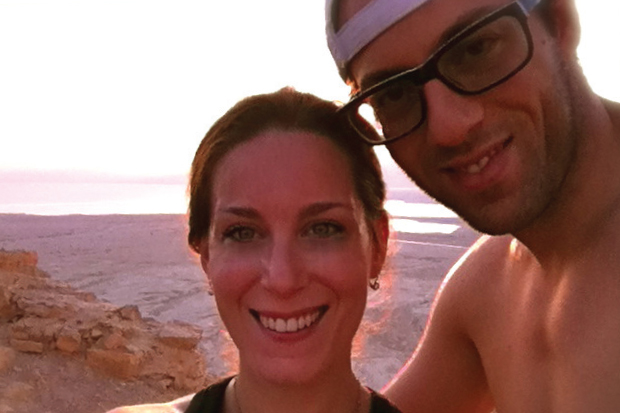Fueling for Fashion

Fashion. I’d be a fraud if I sat here and wrote an article on fashion, how to match clothes, find new trends, or how to look cute hitting the trail or gym. Half of the time, I don’t even know what colors go together. I am no fashion expert. My sister (shown above, in some fun family photos with me), however, happens to be a fashion designer who had a very prestigious career for six years in New York City and continues her work in Austin. Unfortunately, her eye didn’t rub off on me. What I do know about fashion and looking good is that it starts with feeling good. And feeling good begins with food—how and what you eat.
In July, I competed in Israel at the 2013 Maccabiah Games, which is the second largest sporting event in the world. More than 8,000 Jewish athletes from 70 countries came together in Israel to compete in 42 different sporting disciplines. Since finishing the competition in August, I’ve noticed something dramatic has happened to my appetite. And it has changed how I feel.
To give you a little background, I am about 6 feet 2 inches and weigh 185 pounds. I’m 28 years old, and I’ve been a competitive athlete for the past 15 years. As an elite athlete, I typically eat a lot when I’m preparing for events. During peak training, I eat five meals per day. Dispersed between meals are lots of snacks, ranging from carrots, almonds, dried fruit, whole-wheat crackers, seeds, apples, dried cereal, PB&J sandwiches, and rice cakes. Working out up to five hours per day puts tremendous strain on my body and creates a huge need for fuel. Now that the Maccabiah Games have ended, I’m not working out at the same level. Should I be eating the same amount? No!
Since that last competition, I’ve been taking a break from serious training to earn my MBA. This is new territory for me; I’ve really never had any concept of what it is like to live a life without six days a week of intense workouts. I’d always thought that my needs for nutrient-rich foods during training periods were likely more than those of other individuals, but it wasn’t until recently—when I dropped my amount of exercise—that I realized just how much more. The truth of the matter is that, right now, I’m exercising roughly 60 minutes per day and am eating about one-third of what I once did. It’s a dramatic difference.
As a result, my meals have changed. For breakfast, I eat a small bowl of oatmeal with milled flax seeds, blueberries, almond milk, and almond butter around 7:30 a.m.; this healthy start fuels me until about 1 p.m. (when I eat lunch) with a small snack or two in between. Lunch is far diminished from the veggie burger on Ezekiel bread with hummus, tomato, apple, asparagus, almonds, prunes, dark chocolate, rice chips, salad, and cranberries that I’m used to when training. These days, my body tells me it’s not as hungry and requires much less fuel. Eating less while training less is keeping me feeling good. If feeling your best first comes with closely monitoring what your body is telling you, have you listened lately? What is your body telling you?
Perhaps you’re not feeling as good as you could and, in turn, are not looking as good as you could. It’s very possible that this is because you’re simply overeating. Here are a few things to ask yourself:
- Are you hungry when you wake up in the morning?
- How do you feel after eating breakfast? Do you starve your body during a morning workout only to pound down the pancakes and bacon afterwards?
- Do you leave breakfast (or any other meal) feeling stuffed, bloated, or lethargic?
- How long after you eat a meal do you generally get hungry?
- How often do you hydrate? Does your mouth constantly feel parched, or do you have a wet whistle?
Your answers to these questions may reveal that you’re not selecting the best foods for your best self. By monitoring how food and drink affect you, you’re making the first step toward taking better care of your body. Don’t be intimidated. These are your feelings; there is no right or wrong answer, and no one is going to scold you. After all, this is your life to live. What you’re after here is awareness so you don’t cruise through life ignoring your body’s signals. Here’s how listening to my body affects my choices; I
- eat when I begin to feel the slightest bit of hunger. Waiting until I am about to rage can lead to binge eating.
- eat until I feel good and satisfied, not until I feel full. This keeps me from feeling bloated and weighted down. I’ll come back for more food later, if I need to.
- drink often. I keep a water bottle or drink with me at all times. Being dehydrated seriously affects my level of fatigue, mental clarity, and physical performance, so I drink before I get thirsty
While looking good is important, feeling good is key; in this case, the egg definitely comes before the chicken. Without monitoring your levels of hunger, thirst, and food intake, there’s no way you can look your best…no matter what fashion-forward garment you’re wearing.






